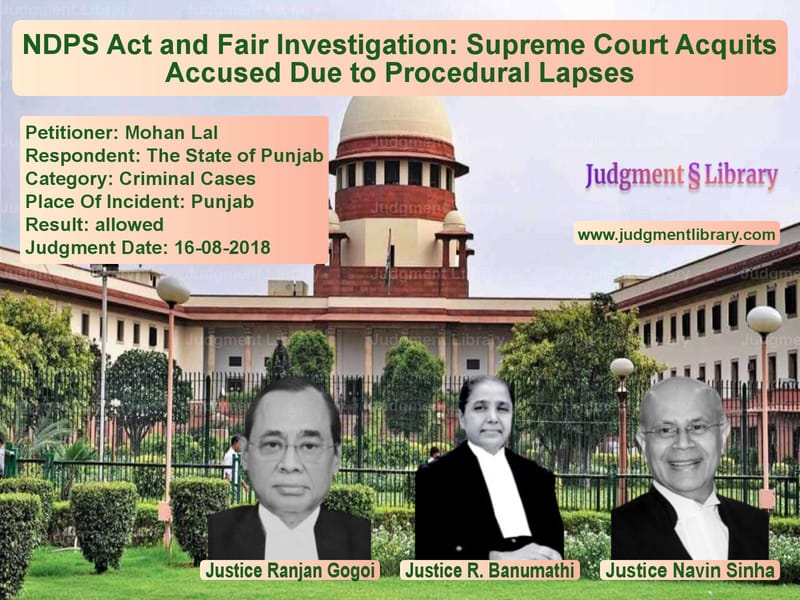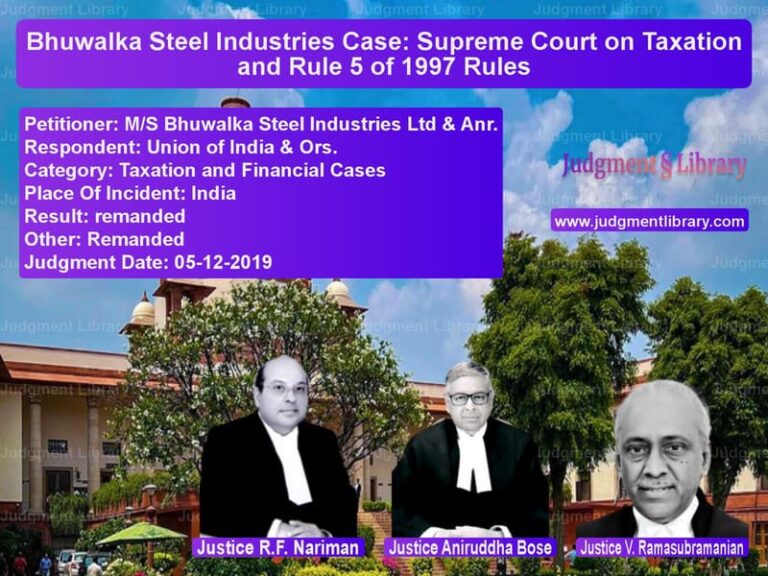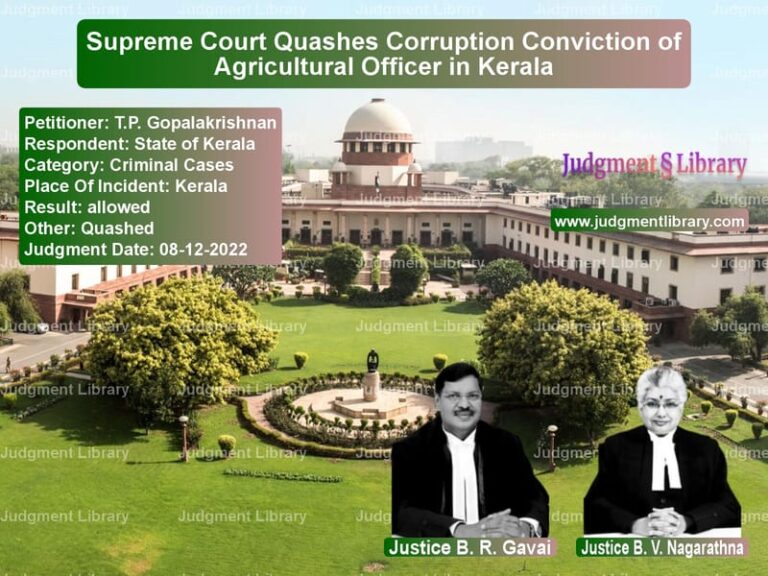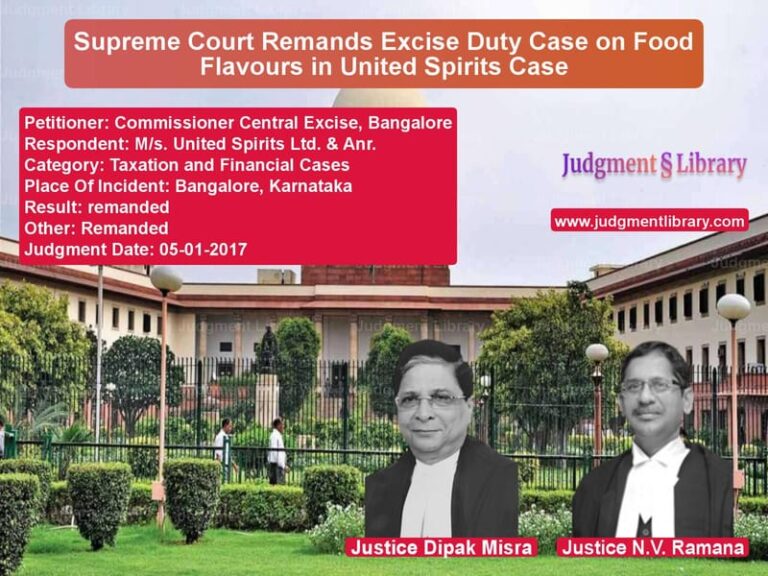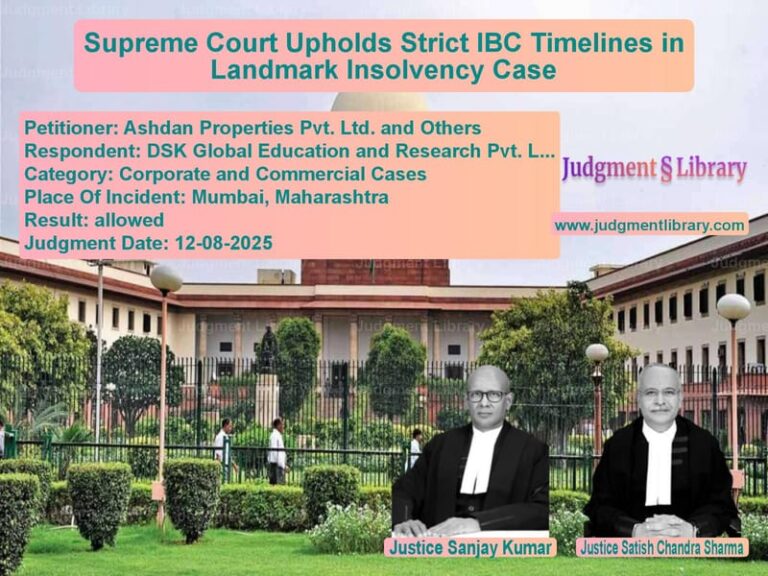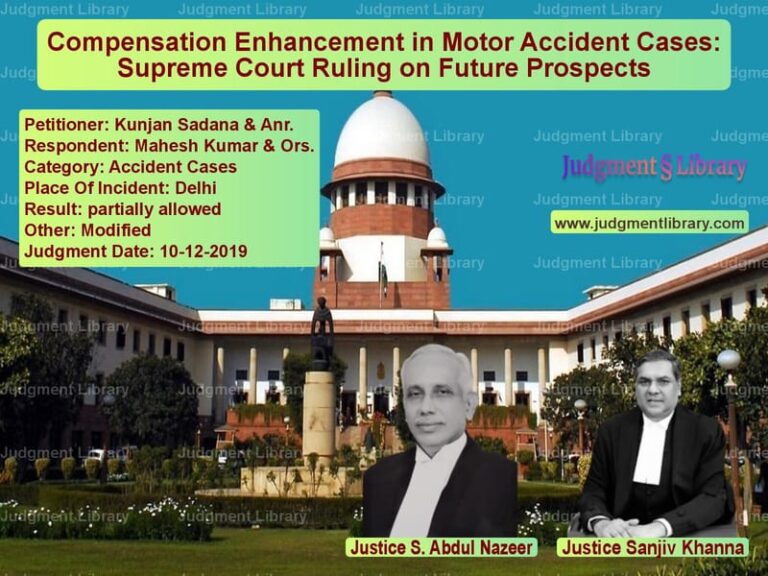NDPS Act and Fair Investigation: Supreme Court Acquits Accused Due to Procedural Lapses
The case of Mohan Lal vs. The State of Punjab revolved around the conviction of the appellant under Section 18 of the Narcotic Drugs and Psychotropic Substances (NDPS) Act, 1985. The appellant was sentenced to 10 years of rigorous imprisonment and a fine of Rs.1,00,000. The main legal question in this case was whether a fair trial could be ensured if the informant and the investigating officer were the same person. The Supreme Court examined the case critically and ultimately held that such a practice violates the principles of fair investigation and justice, leading to the appellant’s acquittal.
Background of the Case
The case originated from an FIR lodged on 3rd February 1997 by Sub-Inspector Chand Singh (PW-1) of the Balianwali Police Station. During patrol duty, he was accompanied by Darshan Singh, Sarpanch, and Assistant Sub-Inspector Balwinder Singh. The appellant, Mohan Lal, was stopped and searched in the presence of a gazetted officer, leading to the recovery of 4 kg of opium from a bag he was carrying. The prosecution claimed that the required procedural safeguards were followed, including obtaining consent for the search.
Arguments by the Petitioner
The petitioner challenged the conviction on multiple grounds:
- The NDPS Act is a stringent law carrying a reverse burden of proof. This requires strict adherence to procedural safeguards to ensure fairness.
- The investigation must not only be fair but also appear to be fair, without creating any apprehension of bias.
- The failure to examine key witnesses, such as Darshan Singh and ASI Balwinder Singh, raised doubts about the prosecution’s case.
- The investigating officer, PW-1, did not deposit the seized opium in the malkhana (police storage), which is a significant procedural lapse.
- There was an unexplained delay of nine days in sending the seized sample for chemical analysis.
- PW-1, being the informant, should not have acted as the investigating officer himself, as this compromised the objectivity of the investigation.
Arguments by the Respondents
The State of Punjab defended the conviction, arguing that:
- The search and recovery were conducted in the presence of a Gazetted Officer, PW-4, ensuring compliance with procedural laws.
- Even though Darshan Singh and ASI Balwinder Singh were not examined, their absence did not vitiate the case because the testimonies of PW-1 and PW-4 were sufficient to prove the recovery.
- The failure to deposit the seized narcotics in the malkhana was a procedural irregularity but did not significantly impact the prosecution’s case.
- The NDPS Act places the burden of proof on the accused to establish their innocence, and the appellant failed to discharge this burden.
- The delay in sending the sample for chemical analysis was not significant enough to raise doubts about the credibility of the prosecution’s case.
Supreme Court’s Rationale
The Supreme Court carefully analyzed the case and found multiple flaws in the prosecution’s conduct, leading to the appellant’s acquittal. The Court observed:
- “A fair trial to an accused, a constitutional guarantee under Article 21 of the Constitution, would be a hollow promise if the investigation in an NDPS case were not fair or raised serious questions about its fairness.”
- “The investigating officer must be independent of the informant to avoid any potential bias. Justice must not only be done but must appear to be done.”
- “The burden of proof on the accused under the NDPS Act does not absolve the prosecution from proving a prima facie case beyond a reasonable doubt.”
- The procedural lapses, such as failure to deposit the seized contraband in the malkhana and the delay in sending the sample for chemical analysis, raised serious concerns about the fairness of the investigation.
- The absence of independent witnesses and the failure to examine key prosecution witnesses weakened the case against the accused.
Key Legal Precedents Considered
The Supreme Court relied on several legal precedents to reach its decision:
- Bhagwan Singh vs. State of Rajasthan (1976): Held that an investigation must be free from bias to ensure justice.
- Megha Singh vs. State of Haryana (1996): Stated that an informant should not be the investigating officer to prevent a conflict of interest.
- Noor Aga vs. State of Punjab (2008): Established that procedural safeguards in NDPS cases must be strictly followed.
- State of Punjab vs. Baldev Singh (1999): Reinforced the importance of compliance with procedural laws in NDPS cases.
Supreme Court’s Judgment
The Supreme Court ultimately ruled in favor of the appellant and set aside the conviction. The Court held:
- “A fair investigation, which is the very foundation of a fair trial, necessarily postulates that the informant and the investigator must not be the same person.”
- “The prosecution is held to be vitiated due to the infraction of the constitutional guarantee of a fair investigation.”
- The appellant was ordered to be released immediately, unless wanted in any other case.
Impact of the Judgment
This landmark ruling reinforced the need for a fair and impartial investigation in criminal cases, particularly under stringent laws like the NDPS Act. The judgment emphasized:
- Police officers must not act as both informants and investigating officers to prevent bias.
- Strict adherence to procedural safeguards is essential to ensure justice.
- Failure to follow mandatory procedures can lead to acquittals, even in cases involving serious offenses.
Conclusion
The case of Mohan Lal vs. The State of Punjab highlights the Supreme Court’s commitment to upholding constitutional rights and ensuring fair trials. By setting aside the conviction due to procedural lapses, the Court reinforced the principle that criminal trials must be free from bias and procedural irregularities. This decision serves as an important precedent for future cases under the NDPS Act and other criminal laws, ensuring that justice prevails over technicalities.
Petitioner Name: Mohan Lal.Respondent Name: The State of Punjab.Judgment By: Justice Ranjan Gogoi, Justice R. Banumathi, Justice Navin Sinha.Place Of Incident: Punjab.Judgment Date: 16-08-2018.
Don’t miss out on the full details! Download the complete judgment in PDF format below and gain valuable insights instantly!
Download Judgment: Mohan Lal vs The State of Punjab Supreme Court of India Judgment Dated 16-08-2018.pdf
Direct Downlaod Judgment: Direct downlaod this Judgment
See all petitions in Drug Possession Cases
See all petitions in Bail and Anticipatory Bail
See all petitions in Judgment by Ranjan Gogoi
See all petitions in Judgment by R. Banumathi
See all petitions in Judgment by Navin Sinha
See all petitions in allowed
See all petitions in supreme court of India judgments August 2018
See all petitions in 2018 judgments
See all posts in Criminal Cases Category
See all allowed petitions in Criminal Cases Category
See all Dismissed petitions in Criminal Cases Category
See all partially allowed petitions in Criminal Cases Category

